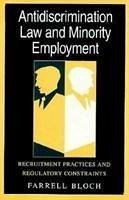A penetrating critique of thirty years of federal antidiscrimination law, this book explains why equal opportunity and affirmative action policies have failed to improve black employment since the 1964 Civil Rights Act. Farrell Bloch reviews the effects of federal hiring policies on minority employment and analyzes recruitment practices to reveal why current laws fail to address some of the most important obstacles preventing minorities from getting jobs. While employment regulations such as Title VII of the Civil Rights Act and the Federal Contract Compliance Program have redistributed minorities from small firms to larger ones, they have not, Bloch argues, significantly improved aggregate minority employment. Many job opportunities are discovered through restricted word-of-mouth networks, and some employers continue to screen out minority applicants in ways that laws do not address. Moreover, some employers avoid hiring minorities, women, and older workers in order to avoid litigation. Bloch discusses the use of economic and statistical analysis in hiring discrimination litigation and examines recent lawsuits to illustrate how these analyses are applied in federal courts. In addition, he addresses federal contractors' affirmative action requirements, theoretical arguments for and against antidiscrimination and affirmative action policy, and a variety of unemployment remedies. By showing that government regulation does not penetrate the informal networks that many people rely on for getting jobs, Bloch provides a new understanding of the limits of antidiscrimination policy for policymakers, lawyers, economists, and human resource professionals.
Hinweis: Dieser Artikel kann nur an eine deutsche Lieferadresse ausgeliefert werden.
Hinweis: Dieser Artikel kann nur an eine deutsche Lieferadresse ausgeliefert werden.








